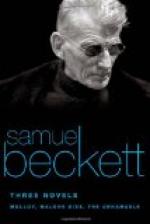|
This section contains 1,911 words (approx. 5 pages at 400 words per page) |

|
Existentialism and Absurdity
A common theme in Anglo-American Modernism is a variation on the philosophy of existentialism, which is important to understanding Molloy, as well as Beckett’s fiction more broadly. Existentialism is a branch of philosophy, or a philosophic viewpoint, that focuses on the nature of human existence, and particularly, the agency of human beings to make choices that determine the course of their life. Though commonly associated with Jean-Paul Sartre, who famously asserted that existence precedes essence, many writers and thinkers in the twentieth century adopted some form of existentialism, in response to the increasing feeling that former systems of belief such as religion cannot account for the fundamentally disorienting experience of existence. The “conclusion” of existentialism is that humans must make their own meaning because the world is fundamentally meaningless as life is essentially absurd – despite human attempts to understand the world through reason...
|
This section contains 1,911 words (approx. 5 pages at 400 words per page) |

|




